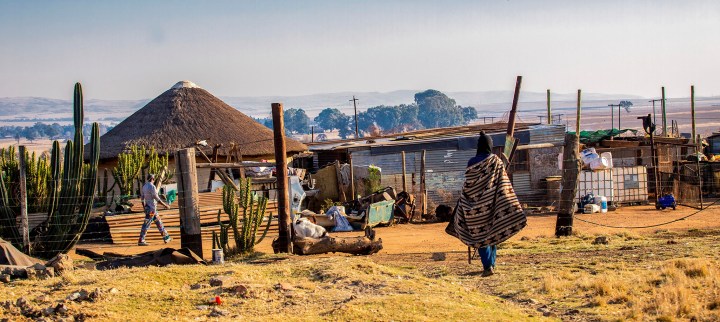MAVERICK CITIZEN WEBINAR
Land rights have become a resource that is given to the elites, say rural land activists

Rural activists say that the Ingonyama Trust judgment reveals a culture of exploitation of the most vulnerable by traditional leadership and the government, to benefit elites.
On Tuesday, the Land and Accountability Research Centre (Larc) hosted a webinar to unpack what the Ingonyama Trust judgment’s impact would be on land tenure rights.
The chief researcher at Larc, Dr Aninka Claassens, explained that the Ingonyama Trust judgment found that people with residential leases with the trust were now entitled to have those leases cancelled and to be refunded the money they would have paid to the trust as a result of the lease agreements.
She said the trust was found to have breached not only the Constitution and customary law, but the Ingonyama Trust Act by which it is governed.
Claassens highlighted that the judgment made a particularly damning finding against the Minister of Agriculture, Land Reform and Rural Development, Thoko Didiza, who has ultimate authority over the trust.
The judgment stated that the minister had failed to protect the rights of rural residents. She was ordered to provide people living off the land presided over by the trust with “permission to occupy” certificates and must report to the court every three months on the progress of the issuing of these certificates until the process is complete.
According to Claassens, a long-time land and rural rights activist, the far-reaching and comprehensive judgment extends beyond the people of KwaZulu-Natal. The ruling breaks new ground by saying that land that is allotted to individuals cannot be communally owned and only land used for grazing can be considered communal.
The judgment also reiterates that it is not in the state’s power to transfer power over land to traditional leaders or anyone else. Therefore the Traditional and Khoi-San Leadership Act, which purports to give traditional leaders the right to enter into agreements on behalf of rural communities, is flawed. Tenure of residential land according to customary law is perpetual, transferable and inheritable.
The director of Larc, Nolundi Luwaya, said the trust presided over four types of leases:
- Business leases between community members and the trust for small businesses such as shops or petrol stations;
- Social service leases, eg, for a church or crèche;
- Residential leases for community members; and
- Third-party leases, between the trust and parties not a part of the community for access to communal land for commercial purposes.
Luwaya explained that only the residential leases would be automatically cancelled and refunded as per the judgment. However, she said, there may well be instances where holders of “permission to occupy” certificates for commercial and social service leases could argue that their full and genuine consent was not obtained in concluding a lease.
People who have issues with the business and social service leases have the recourse to approach the parliamentary portfolio committee responsible for rural land development, the department itself or to litigate.
Luwaya said that while the Auditor-General had regularly audited the trust’s books, the audits had never been clean and were always qualified.
If the minister doesn’t do as the judgment ordered, said Luwaya, the matter can be taken back to court in order to compel her to do so. She said they would be watching how the government handles the issue of refunds.
“What’s happening now is that land rights have become a resource that is given to the elites,” said Claassens. The debate now seemed to be about how to “muddy the waters and obfuscate” in order to give elites rights over the most vulnerable.
Claassens said it was “disappointing” that the trust was appealing against the judgment. DM/MC



















 Become an Insider
Become an Insider
Comments - Please login in order to comment.